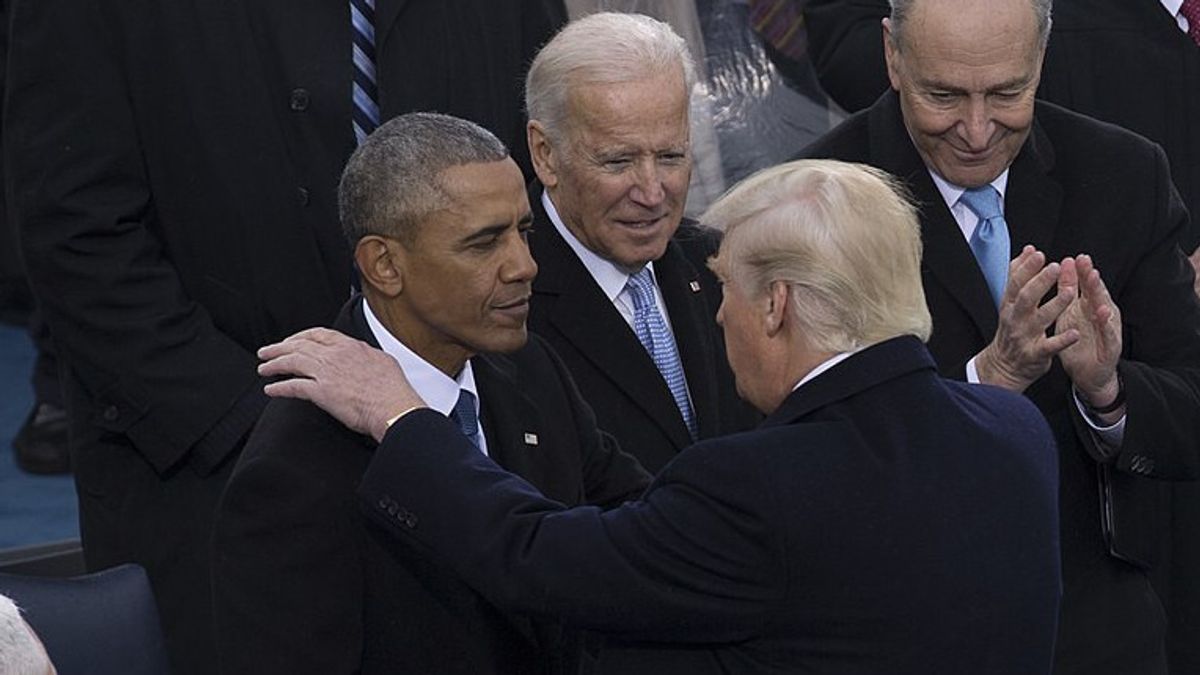JAKARTA - The move by the President of the United States (US) Donald Trump to immediately replace the position of the US supreme justice was strongly opposed by his rival, Joe Biden. The reason is, the election of justices is an important matter that can affect the lives of US citizens in decades.
Previously, Trump said he would immediately replace the position of the notorious liberal judge, Ruth Bader Ginsburg, who died last Friday. Suddenly Biden voiced his protest at the same time when the second Republican Senate voiced the same thing as preached by Reuters.
Such a presidential appointment, with the Senate's blessing, would strengthen the conservative 6-3 majority. If that means, it is likely that US law and life policy will be towards a conservative direction within a few decades.
Meanwhile Democratic presidential candidate Joe Biden urged Senate Republicans not to vote on any candidate nominated to the US Supreme Court. He called President Donald Trump's plan a "crude political power exercise."
"The voters in this country must be heard, it is they who are expected by the Constitution to decide who has the power to make these appointments," said Biden.
"To stop this nomination through the Senate is just an exercise in raw political power," he added.
The former vice president rejected the idea of releasing the names of potential candidates for justice. Biden said that doing so could influence the candidates' decisions in the current court role as well as expose them to "unrelenting political attacks."
Earlier on Sunday September 20, Senator Lisa Murkowski of Alaska said she did not support Trump's plan to move quickly to fill the seat of chief justice. He became the second of 53 Republicans in the 100-seat room to object to Ginsburg's accelerated replacement.
On Saturday September 19, Republican Senator Susan Collins of Maine also said the president-elect had the right to elect candidates for the supreme court. Collins is currently in a tough re-election battle, with Murkowski's current tenure being extended by another two years.
Meanwhile, moderate Republican senator Lamar Alexander, did not object to the idea of a vote. "Nobody should be surprised that a majority Senate Republican will vote on Republican supreme justice nominations, even during the presidential election," he said.
Learn from pastWe take the example four years ago. At that time, Judge Antonin Scalia, a close friend of Ginsburg, died in February 2016. But at that time, the Democrats did not immediately rush to hold a new judge appointment procession because the time was close to the election.
At that time Republicans blocked the confirmation hearing for the judge nominated by Barack Obama. New judges were nominated when Trump was elected in January 2017. At that time he offered Judge Neil Gorsuch to fill the vacant position before.
Trump's plans to replace Ginsburg were carried out before he died. However, Ginsburg at that time refused.
"My strongest wish is that I will not be replaced until a new president is installed," Ginsburg wrote in a statement to his grandson before his death, according to National Public Radio.
Not surprisingly, when Ginsburg left, Trump was desperate to "put" new people in strategic positions. Trump said he would nominate the chief justice for the seat this week and appointed Amy Coney Barrett of the Chicago-based US Court of Appeals for the Seventh Circuit. Trump also named Barbara Lagoa of the Atlanta-based 11th Circuit as a possible candidate for the Supreme Court position.
Ginsburg's death turned the tide of the presidential campaign, energizing Trump's conservative base, who was eager to see the court overturn the 1973 Roe V. Wade ruling that legalized abortion nationwide. This presents new complications in the battle for control of the US Senate.
The vital role of the US Supreme CourtAccording to the BBC, the US Supreme Court is often the final say on highly controversial legislation, disputes between the state and the federal government and the final appeal to stop executions. Courts hear less than 100 cases a year and a landmark announcement was made in June.
Cases are usually brought to court after appeals from a series of lower courts, although in sensitive cases, lawyers can petition for hearings. Court opinions can also set a precedent, directing other judges to follow their interpretations of similar cases.
In recent years, the US Supreme Court has expanded gay marriage to all 50 states, allowed President Donald Trump's travel ban to take effect, and delayed US plans to reduce carbon emissions. Ginsburg himself opted to resolve progressive issues in court, including enforcing key sections of the 2010 Affordable Care Act, commonly known as Obamacare, and legalizing same-sex marriage.
Since being elected president, Trump has chosen two new judges, Neil Gorsuch and Brett Kavanaugh. Prior to Ginsburg's death, the court was considered to have had a 5-4 conservative majority, leading to what some have called the most conservative tribunals in modern US history.
However, US Supreme Court Chief Justice John Roberts, who is nominated by the Republican president, has sided with four liberal judges in several decisions, including cases involving abortion.
US research shows that the Supreme Court's influence abroad has waned over the past two decades. This is because the court systems in other countries are more developed and US influence generally diminishes. Fewer international courts cite the opinion of the US Supreme Court, the more that cite the European Court of Human Rights and other highest national courts.
The English, Chinese, Japanese, Arabic, and French versions are automatically generated by the AI. So there may still be inaccuracies in translating, please always see Indonesian as our main language. (system supported by DigitalSiber.id)













